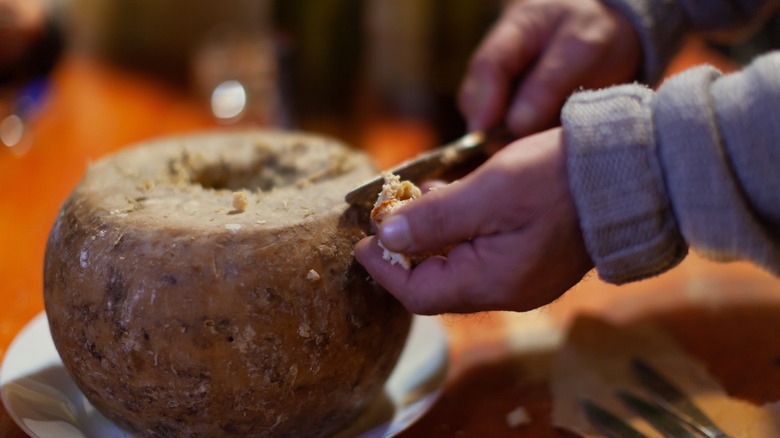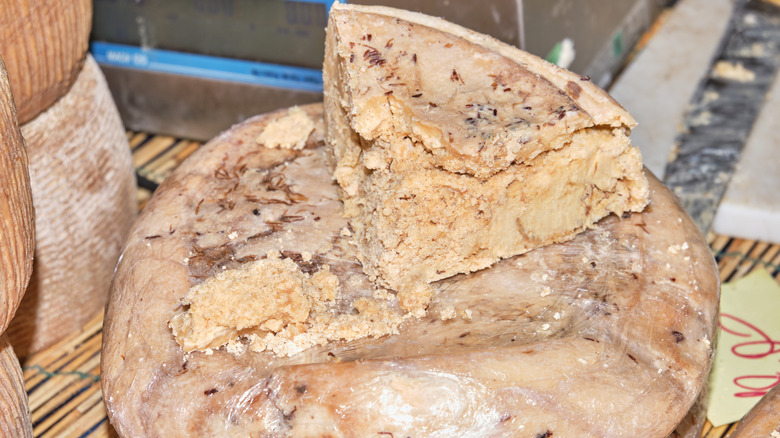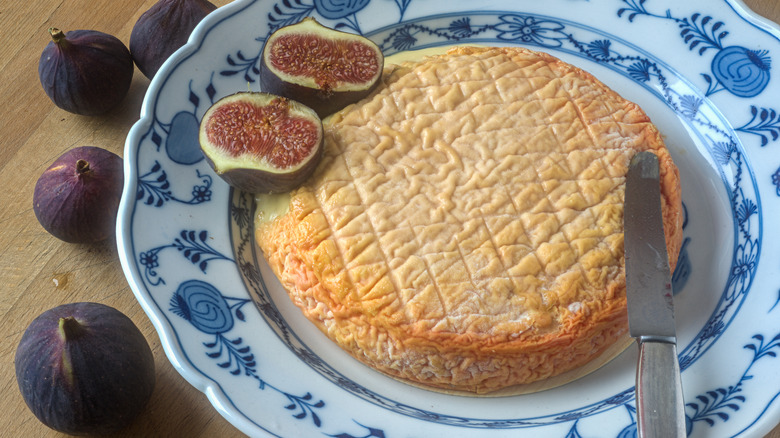The Worm-Filled Cheese Delicacy That's Built For Foodie Dare Devils
Foodies often like to playfully boast about their adventurous palates, and how they're willing to try everything. It's great to be so open minded, especially if you're traveling and more likely to come across foods that you might not be familiar with. But even the most daring taste buds have their limits. For many, that limit just might be found in a Sardinian cheese called casu marzu, which translates to "rotting cheese." And if you think something like this is akin to blue cheese, with mold running throughout, think again; casu marzu exists on an entirely different level of rotten.
What makes it so difficult to digest is the fact that it is crawling with maggots. There's really no pretty way to put it. These creepy crawlies are intentionally placed within the cheese in its early stages of production and remain there, even as it is served. Once ingested, the maggots can potentially survive the treacherous dip in stomach acids and may pass through the intestinal walls, causing a mess of health concerns. These cases are rare, but still, because of this, casu marzu is also known as the world's most dangerous cheese. If you're willing to try this extreme delicacy, your best chance in finding it is going to be in Sardinia, as it's almost universally banned. Even on the Italian island, you're not likely to come across it in trattorias or markets in piazzas; typically, families make their own.
Why so wormy?
The cheese starts out innocently enough; it's basically a wheel of Pecorino Sardo. However, in the early stages of aging, a specific breed of fly is introduced to the wheels, where the insects lay their eggs. The maggots that hatch eat and excrete the cheese for two to three months, leaving behind a very soft, creamy, spreadable cheese that has been a delicacy in Sardinia for hundreds of years. It's traditionally served simply, with bread and glasses of local wine.
Casu marzu is sometimes described as spicy and pungent. One of the steps in eating this cheese is to inspect it closely before you take a bite. Believe it or not, you want the maggots to be actively wriggling around; this is a sign that the cheese is fit to eat. If they are dead, that means the cheese has turned toxic and inedible.
Some brave cheese-eaters try to prepare for battle when they sample casu marzu. It's not uncommon to plug your nose and wear goggles because (you should stop eating your lunch now, if you haven't already) the maggots tend to jump and crawl their way onto your face. That said, there are ways to remove the insects before you eat the cheese. Many who have tried it agree that casu marzu is a tasty cheese. What's difficult is getting past exactly how it became so tasty.
The cheese banned-wagon
While casu marzu is banned in most of the world, there are several other cheeses not allowed in the United States that are perfectly acceptable in other countries. The Food and Drug Administration is well-known for its strict rules and regulations when it comes to imported cheeses and other foods, much to the dismay of American chefs and gourmands. For the most part, the U.S. does not allow the import of cheeses made from unpasteurized milk, and if a cheese is made with raw milk, it must be aged for at least 60 days. This means no authentic Camembert, Brie, or Roquefort, among many others. Never mind that we allow plenty of snacks that are banned in several other countries.
Some cheesemakers will make pasteurized versions of cheeses that are otherwise banned in America, like Époisses de Bourgogne, a prized, creamy, funky French cheese that's been produced since the 16th century. In fact, Napoleon Bonaparte was supposedly a big fan of it. However, many agree pasteurized versions just aren't the same — or as good — as the originals.
While world travelers who have sampled excellent cheeses around the globe are surely disappointed they can't get many of them in the U.S., the demand for casu marzu is probably much smaller, existing among only the most adventurous of eaters.


